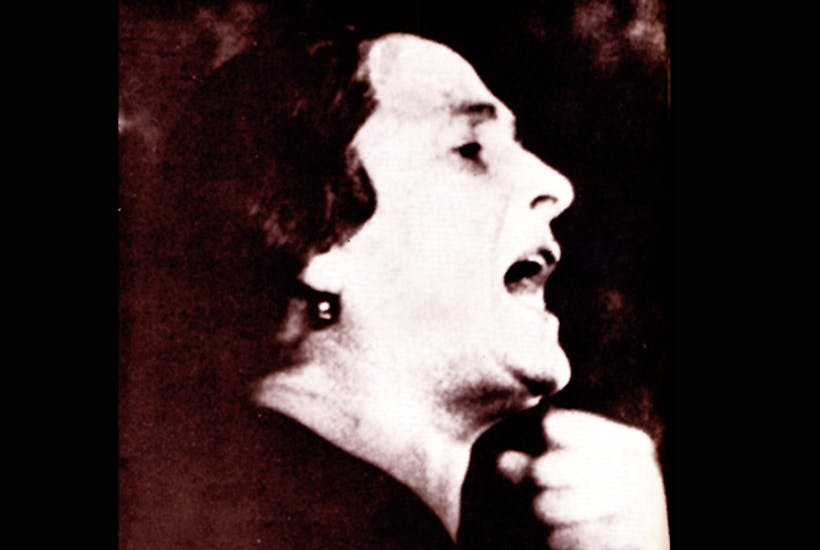Complaints about the decline and fall of political oratory are nothing new. Back in 1865 a British reporter branded the Gettysburg Address ‘dull and commonplace’ and, as this joy of a book points out, even Cicero had to put up with the Neo-Attics sniggering from behind their togas at his overwrought and outdated speaking style. The poor Roman must have felt rather like Harry Kane when a bunch of pub footballers take to Twitter to bemoan his inability to find the target.
In rhetorical terms, Philip Collins is a long way from a Sunday League layabout. With three years as Tony Blair’s principal speechwriter/verb-remover, followed by a successful career as a leader writer and columnist for the Times, he is certainly no stranger to the art of persuasion. This experience regularly comes to the fore in his analyses of contemporary political speeches for the Times, and it’s a format that he uses here to run the rule over 25 great and influential speeches from the past 2,500 years.
There’s no shortage of ‘great speech’ anthologies on offer, most of which simply reproduce the same dozen or so transcripts alongside a brief commentary. Collins goes much further, drawing on an eclectic selection of speeches and drilling down on a technical level to explain how a speech is structured, what rhetorical techniques are used, and why it had such an impact.
We see how Lincoln channeled Pericles as he used the individual as a metaphor for the nation, and how Reagan repeated the trick in Berlin more than a century later. We get a crash course in the power of imagery thanks to a 1991 address by Aung San Suu Kyi, although recent events in Burma lend a grim poignancy to her talk of ‘the spark of courage that is an essential attribute of those who would free themselves from the grip of oppression’. We even take a look at how Adolf Hitler held an adoring audience in the palm of his hand — an experience that, as the author notes, is ‘unedifying but instructive’. It’s a reminder that mastery of speechmaking is not the sole preserve of the good guys.
Collins also displays a refreshing hint of iconoclasm. Brave is the speechwriter who finds fault with the words Ted Sorensen penned for JFK’s inaugural address, but Collins deftly identifies a handful of contradictions and discordant notes that, if nothing else, simply serve to highlight how perfectly written the rest of it is.
Barack Obama is the only 21st-century speaker who gets a look-in. His rhetorical back catalogue is so strong that he could have provided a dozen candidates for inclusion but, in common with the rest of the book, Collins chooses a less well-remembered example, the 2012 election night address. Usually ignored in favour of its 2008 equivalent, it didn’t even make the cut in a recent collection of ‘Obama’s 26 greatest speeches’. But Collins’s skilful analysis shows it deserves a much higher profile.
Less hopey-changey and more pragmatic, it’s a side to the former president the world didn’t see much of, so its inclusion is very welcome. Yet even here it struggles to escape the shadow of its better-known predecessor, with Collins incorrectly locating it in Chicago’s Grant Park — where the 2008 speech was delivered — rather than the cosier confines of the McCormick Place convention centre used four years later.
Each analysis is strong enough to stand alone but they also work well as a collection, referring back and forth to demonstrate the way themes, techniques and language echo through the years.
The book proves less successful in its attempt to draw a broader lesson from all this, to say something about modern politics and the state of democracy. As Collins himself writes: ‘The craft of a wide-ranging speech is to find a theme that strings together its disparate parts.’ But his book falls short of doing so.
The between-chapter transitions, in which the author ponders the nature of populism and the challenges facing modern politics, provide an interesting take, but they don’t quite click with the text on either side. And while Collins undoubtedly demonstrates that quality rhetoric is a useful tool in a thriving democracy, his claim that a lack of great speakers in modern politics shows democracy itself is in trouble feels a much shakier proposition — not least because, as we’ve seen, criticism of contemporary rhetoric is as old as rhetoric itself.
But this feels like nitpicking. The backbone of the book, the analysis of 25 examples of great oratory, is more than strong enough to carry the rest of it. Anyone interested in the past, present and future of speeches and speechwriting will find it a fascinating read. For those of us who like nothing better than to marvel at effective use of an anaphoric tricolon, it’s an absolute must.






Comments